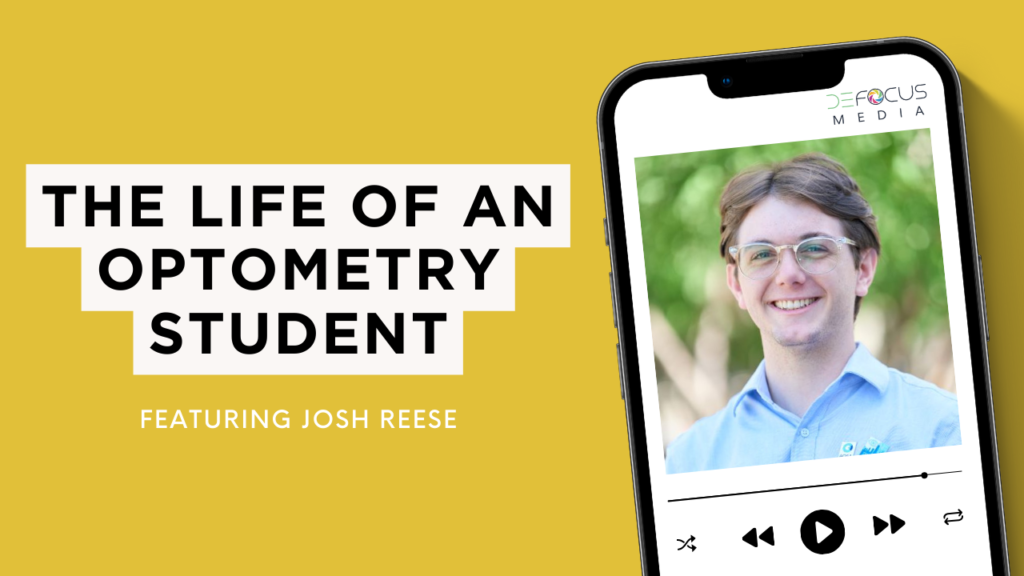Podcast: Play in new window | Download
Subscribe: Apple Podcasts | Spotify | Amazon Music | Android | RSS
Join us on this episode as we dive into the life of an Optometry student with Joshua Reese, a 3rd-year optometry student at the Arizona College of Optometry. Joshua is not your average student; he’s a dedicated advocate for aspiring optometry students and an aspiring neuro-optometrist with a passion for making a lasting impact on post-concussion patients.

In this engaging conversation, Joshua shares his journey, from getting started in the field to his inspiring mission of helping pre-optometry students realize the incredible potential of optometry as a career choice. He’ll also discuss practical tips on how current optometry students can get more involved in their field and make a difference in patients’ lives.
Whether you’re a prospective optometry student, a current student, or simply curious about the world of optometry, this episode offers valuable insights and inspiration from a passionate advocate. Tune in and discover how Joshua Reese is making waves in optometry and paving the way for the next generation of eye care professionals.
Are you considering optometry school, or are you currently enrolled? As a student, what changes will you bring to the field? How do you plan to navigate your studies? For the seasoned ODs, are you curious about the mindset of today’s optometry students? Well, today, we have Josh Reese with us. He’s a shining star in eye care and optometry education, and he’s here to share his journey, giving us a deeper understanding of life in optometry school.
What’s Covered?
Why did you choose to attend optometry school?
Dr. Darryl Glover:
Josh, could you start by giving us a glimpse into your background? Maybe share a fun fact about yourself. Then we can dive into your journey and impact in eye care.
Joshua Reese:
Sure thing. I’m from Vancouver, Washington, near Portland, Oregon. I’m currently at the Arizona College of Optometry, which is quite different from Washington, but it’s great. I love the rain in Washington, studied in Utah, and now I’m here in Arizona. A fun fact about me? Well, I might not be the most interesting person, but I enjoy fun and have a bit of a nerdy side. For instance, I can solve a Rubik’s Cube.
Joshua Reese:
I love this question because it’s common in optometry school interviews. My motivation began with a genuine desire to help people. I wanted a career where I could positively impact lives daily. My journey here wasn’t straightforward. As a kid, I visited a museum displaying human anatomy and cadavers, which made me queasy. My dad joked that I’d never work in healthcare, and I believed it for a while. But in college, I felt drawn to healthcare despite my squeamishness. I explored various fields before choosing optometry.
As a first-year optometry student, can you provide me with information about what the first year of optometry school is like?
Dr. Darryl Glover:
Absolutely, that approach is very relatable. Let’s delve into your first year in optometry school. What was it like for you?
Joshua Reese:
The first year was a huge learning curve. Everyone had iPads, downloading notes and preparing for boards. I quickly learned that preparation is key. Some might think optometry is easier than other medical fields, but it requires just as much dedication and hard work. You’re training to be an optometric physician, after all. My first class was overwhelming; it covered all of my undergraduate learning in just two hours. That first year was about learning to study effectively and retain information.
Could you provide some information about what the second year of optometry school is like?
In my second year, I realized the importance of every piece of information. Unlike general science classes, where I could score well by knowing most of the material, optometry subjects like visual neurophysiology and advanced ophthalmic optics required a thorough understanding. Scoring lower than expected on exams was a wake-up call. It’s not just about passing tests; it’s about being clinically competent. You need to internalize the knowledge for practical application.
What is the experience like during the third year of optometry school?
Indeed, it’s a process of becoming. Let’s talk about the third year, which is often a pivotal time in optometry school.
Joshua Reese:
I definitely think I could focus more on what’s important. The third year is interesting because you shift from intensive study to mostly clinical work. The time outside the clinic, often perceived as free time, should be dedicated to studying for boards. I once heard a quote: “When life gets easy, that’s when you need to go hard.” That’s especially true in the third year. You’re still attending challenging classes, but it’s crucial to prepare for boards intensively.
It’s a bit abstract; becoming an optometrist means proving your knowledge. This involves reinforcing what you’ve learned, even if it’s encountering new information for the first time during your studies. So, yes, the third year is when you need to pull yourself together and excel. The board exams are looming – I’m taking mine in less than three months.
How can we increase awareness about the optometry profession?
Joshua Reese:
This topic isn’t often discussed, so I’m glad you’re bringing it up. It’s not that optometry lacks marketing; it’s about recognizing its value once discovered. Some people, including optometrists, view the field as less prestigious than other medical professions. We’ve even struggled for the recognition of being called doctors. The profession needs more positive representation and advocates. I’m a huge fan of Defocus Media and its efforts. When people discover optometry, seeing peers they admire will likely increase interest and applications to the field.
Joshua Reese:
Absolutely. The role I play as an optometry student in creating media is crucial. The general public often turns to established professionals like you, Dr. Glover, or Dr. Eye Health for information. However, optometry students need to be more visible in media as well. Despite our busy schedules, we should share our experiences to reach future optometrists. These individuals seek insights into optometry school life, and our content can guide them. My message to fellow students is to create content – YouTube videos, TikToks, Instagram posts – to fill this gap in media representation.
Dr. Darryl Glover:
I wholeheartedly agree with that strategy, and I’ve been impressed with your use of social media, particularly on YouTube and TikTok.
Dr. Darryl Glover:
Regarding your content, I’m curious about which of your videos has garnered the most engagement and what your thoughts are on why they’ve succeeded.
Joshua Reese:
Yeah, the first video I made was quite simple. I was walking my dog, pondering how to use my time productively. At that point, I was applying to optometry school and had just taken the OAT. I made a quick video on my phone discussing the exam and sharing tips about biology and physics. It might only have 40 views, but it was a stepping stone, encouraging me to create more content. My mantra is that if knowledge would have helped me as a pre-optometry or optometry student, it needs to be shared.
The most impactful videos are often those quick, authentic ones where I share thoughts or experiences, like taking an exam or receiving my equipment. Optometry students should focus on these types of media – content that would have helped them in the past.
Identifying Gaps in Optometry Education
Dr. Darryl Glover:
I’m interested in your thoughts on existing optometry gaps. Your insights could provide valuable guidance for educational leaders, possibly leading to improvements.
Joshua Reese:
That’s something I’ve pondered a lot. The first major disconnect, I believe, occurs at the top. I remember a conversation with a board member from the NBEO during Optometry’s Meeting in D.C. He was concerned about the caliber of students being admitted to optometry schools. I fundamentally disagree with that. The education provided by these institutions is rigorous. I’ve met exceptionally bright individuals from various optometry schools across the U.S., Canada, and Puerto Rico. The real challenge is ensuring our voices are heard. We’re making progress, but there’s room for improvement.
Optometry is evolving; the scope is expanding, and the expectations are increasing. However, I believe schools are increasingly effective in preparing us for boards. My school in Arizona, for instance, introduces new initiatives each year to equip students better. It’s not about certain classes being superior; it’s about fostering a supportive community where everyone helps each other excel. The overall pass rate remains high, but we can always strive for better. It’s crucial for those at the top to recognize our efforts and understand that we are all committed to giving our best. It was a lengthy response, but it’s a complex issue that warrants detailed discussion.


